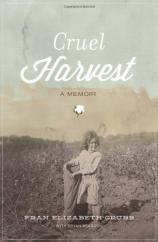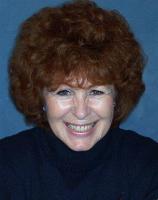Cruel Harvest: A Memoir
Review
Cruel Harvest: A Memoir
People in the U.S. who hear or read the term "migrant workers" tend to think of two demographic groups: immigrants (particularly Latinos) today and in the recent past, and poor Americans who followed the seasons and the crops during the Great Depression and the Dust Bowl of the 1930s. So the first shock in Fran Grubb's powerful memoir is the realization that her childhood as a migrant worker took place in the 1950s and 1960s. But as surprising as that is, it's pretty mild compared to the terror to come.
Bear in mind that Grubb was a worker, not just the child of migrants. From a very young age, she worked the cotton fields and apple orchards from dawn to dusk along with her siblings, whose combined meager wages fed their alcoholic father's addiction but seldom put food on the table. In fact, the family rarely even had a table, living as they did in cars, abandoned shacks and migrant housing.
What they did have was abuse, and plenty of it. The incomprehensible and inhuman behavior of her father, whom she still somehow manages to call "Daddy," permeates every page of Grubb's memoir, even on those pages where he is not mentioned. He beats her, her mother and her siblings to within an inch of their lives, sells her brother to an uncle for $5, presumably causes the death of her newborn sister, and rapes his daughters.
"It's a valuable read for many reasons, not the least of which is the glimpse it offers of the uprooted, itinerant lives of migrant workers in the not-so-distant past. But its greatest value may lie in its author's vulnerability..."
So while Grubb and her siblings never received much, if any, formal schooling --- they were too busy in the fields, working or hiding from truant officers --- they received a different kind of education. They learned what would set their father off, how to avoid another eruption, and how to stay alive when their efforts proved to be no match for his rage. His daughters learned an extra lesson: how to endure his repeated sexual abuse with their sanity intact.
Grubb's chilling account of her life before she ran away from her father at 14 is interspersed with the story of her life decades later when her husband finds her siblings, all of whom managed to escape her father's clutches before she did. Those passages, while at times disjointed and lacking a clear transition, come as a welcome relief from the stories about the horror of her childhood.
Even as Grubb describes the few times in her young life when hope appeared on the horizon, you just know things will take a turn for the worse. Her aunt, who lives in a real house, takes her family in during a brief time when her father was in jail --- and proceeds to withhold food and water from Grubb and her siblings. Her mother, who is practically catatonic at times, finds the wherewithal to get away from there and put her children in school but begins drinking heavily and neglecting the kids --- and they are sent to a children's home.
There, Grubb finds love, acceptance, regular meals, and an education in the ways of the world: how to make a bed, how to take care of herself, her appearance and her clothes, even how to eat the way "normal" people do. But that only lasts until her father smooth-talks the administration into letting him take her and her sister on a two-week "vacation" that stretches into a four-year return to migrant work.
To her credit, Grubb tells her story with grace. She's never self-pitying. She never lets her father off the hook, but neither does she allow bitterness to saturate the accounts she offers; she lets his brutality speak for itself. All in all, she does a remarkable job in what had to be an enormously difficult task --- recounting in detail the nightmare that was her life for so many years.
That said, CRUEL HARVEST could have used a stronger editorial hand. The larger themes of loss of innocence, guilt, shame and even faith are missing. Although as an adult Grubb is able to forgive her father, her story is one of survival rather than forgiveness. What is so striking is the missed opportunity to show the profound truth of authentic forgiveness. Forgiving her father comes across as a fairly simple process instead of what was most likely the hardest thing she has ever had to do.
The faith element also comes up short. As a child, Grubb went to church a few times, but there's no mention of any great spiritual influence on her life. People showed her kindness and compassion, but there's little evidence of religion or spirituality in her childhood except for occasional moments when she prayed out of sheer desperation. Yet as an adult, she is clearly a faith-filled evangelical Christian. How did she get there from where she was? A sequel to CRUEL HARVEST is in the works, but the promise of a second book should never be made at the expense of the first book, which is what happens here.
Still, Grubb's toughness, resiliency and so many other qualities that characterize a true overcomer are evident throughout her memoir. It's a valuable read for many reasons, not the least of which is the glimpse it offers of the uprooted, itinerant lives of migrant workers in the not-so-distant past. But its greatest value may lie in its author's vulnerability --- and the tacit permission she gives to others who may feel the need to confront and expose their difficult past.
Reviewed by Marcia Ford on September 19, 2012
Cruel Harvest: A Memoir
- Publication Date: August 14, 2012
- Genres: Christian, Nonfiction
- Hardcover: 272 pages
- Publisher: Thomas Nelson
- ISBN-10: 1595555056
- ISBN-13: 9781595555052




